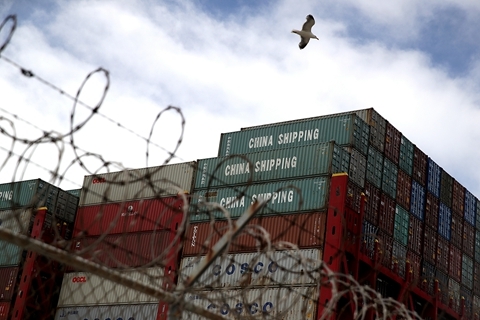U.S. Restricts Sales of Sensitive Goods to China

The U.S. fired another shot in the escalating trade war with China.
The Department of Commerce's Bureau of Industry and Security (BIS) added 44 Chinese entities to an export control list. Foreign companies on the list face tough restrictions on buying American goods that are controlled under U.S. Export Administration Regulations, according to a notice published Wednesday in the Federal Register.
The move, effective Wednesday, coincided with confirmation that President Donald Trump is considering more than doubling its planned tariffs on $200 billion of Chinese imports. Beijing reacted angrily to the news, accusing Trump of “blackmail” and threatening retaliation.
Among the entities added to the export control list are two large state-owned enterprises, China Aerospace Science and Industry Corp. and China Electronic Technology Group Corp., and their multiple subsidiary institutions.
The U.S government determined these entities to be acting contrary to the national security or foreign policy interest of the U.S., and some entities are involved in the illicit procurement of commodities and technologies for unauthorized military use in China, the BIS said in the notice.
For all 44 entities, the BIS imposed a license requirement for the export, re-export or transfer of all items subject to the export administration regulations and a license review policy of presumption of denial, meaning licenses will not be approved without a compelling reason.
The items subject to export administration regulations include nuclear materials, chemicals, electronics, telecommunications equipment, sensors and lasers.
In April, Chinese telecommunications giant ZTE was slapped with an export ban by the BIS after the company was caught shipping U.S. technology to Iran and North Korea in violation of U.S. sanctions on those countries. The ban was lifted after three months of negotiations and ZTE’s payment of a $1 billion penalty.
The ZTE ban, which has been a major part of trade negotiations between the U.S. and Chinese governments, forced the company to cease major operations for more than two months.
It’s hard to predict the impact of the expanded export controls on Chinese companies, a semiconductor industry analyst told Caixin.
Most of the companies added to the U.S. restrictions list are state-owned aerospace and military enterprises, which rely less on U.S. components, but China may still need to think of alternative options on certain key supply chains, the analyst said.
Some of the added entities are high-tech research institutions, such as China Electronics Technology Group’s No. 13 Research Institute, which is engaged in semiconductor research and development, and No. 14 Research Institute, which is considered the birthplace of China’s radar industry. China Aerospace Science and Industry Corp. is the biggest missile weapon-system developing and manufacturing enterprise in China.
Among the 44 entities, Hebei Far East Communication System Engineering is a subsidiary of Shenzhen-listed GCI Science & Technology Co. Ltd, which makes communication systems and network equipment. China Electronics Technology Group’s No. 7 Research Institute is GCI’s largest shareholder.
GCI’s shares dropped by 3.65% Wednesday. The stocks of China Electronics Technology Group’s and China Aerospace Science and Industry Corp.’s listed subsidiaries also plummeted Wednesday.

- 1Cover Story: China Carves Out a Narrow Path for Offshore Asset Tokenization
- 2Drownings Shake Chinese Enthusiasm for Travel to Russia
- 3Over Half of China’s Provinces Cut Revenue Targets
- 4Li Ka-Shing’s Port Empire Hit by Forced Takeover Amid Panama Legal Dispute
- 5In Depth: China’s Mutual Fund Industry Faces Overhaul After a Banner 2025
- 1Power To The People: Pintec Serves A Booming Consumer Class
- 2Largest hotel group in Europe accepts UnionPay
- 3UnionPay mobile QuickPass debuts in Hong Kong
- 4UnionPay International launches premium catering privilege U Dining Collection
- 5UnionPay International’s U Plan has covered over 1600 stores overseas





